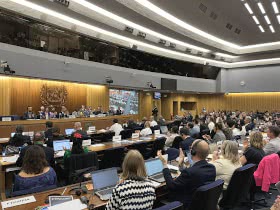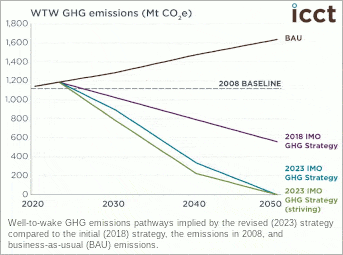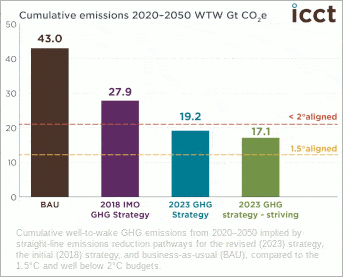
Today, at the conclusion of its eightieth session, the
Marine Environment Protection Committee (MEPC) of the International
Maritime Organization (IMO) agreed to the revision of the
Strategy for the reduction of greenhouse gases from
ships establishing to achieve, with respect to the emissions produced
from maritime transport in 2008, zero emissions
by or around 2050 and to establish "checkpoints"
indicative" in order to achieve a reduction in
emissions of at least 20% with the aim of rising to 30% by
2030 and at least 70% with a target of 80% by 2040.
Originally the strategy for reducing greenhouse gases
generated by shipping, which had been adopted by
Seventy-second session of the IMO MEPC
( of 13
April 2018), provided for a cut of at least 40% of the
carbon emissions by 2030 and a reduction of at least 50%
of greenhouse gas emissions by 2050, again with reference to
at 2008 levels.
of 13
April 2018), provided for a cut of at least 40% of the
carbon emissions by 2030 and a reduction of at least 50%
of greenhouse gas emissions by 2050, again with reference to
at 2008 levels.
 In addition, the new strategy foresees that by 2030 at least the
5%, with the aim of increasing to 10%, of the total demand for
energy from maritime transport is supplied from fuels or sources
of zero- or near-zero emission energy.
In addition, the new strategy foresees that by 2030 at least the
5%, with the aim of increasing to 10%, of the total demand for
energy from maritime transport is supplied from fuels or sources
of zero- or near-zero emission energy.
A review of the measures for
reduce GHG emissions from shipping
on the basis of the results of a report on the implementation of the
measures to be presented by the MEPC during its
Eighty-first session to be held in spring 2024
and a final report presented at the next session
scheduled for autumn next year. The new measures
should be approved in 2025 during the spring session
of the MEPC and then adopted the following autumn by the Committee for
the protection of the marine environment of the IMO.
The independent non-profit organization International
Council on Clean Transportation (ICCT) has produced a first
comparison of the effects of what was agreed by the session of the
MEPC ending today and the initial strategy of 2018,
initial strategy - ICCT recalled - which was not compatible with
the Paris Agreement's goal of limiting warming
well below two degrees Celsius and continue the
efforts to limit it to 1.5 ° C. ICCT explained
whereas, on the basis of its own new estimates, with the revision of the
Strategy agreed this week on maritime transport
international will exceed its current share of the budget
global carbon of 1.5°C by around 2032, but not
will exceed the global carbon budget by positioning itself well
below 2°C, well below - he specified
the organization - which can be interpreted as a
reduction of 1.7°C.

